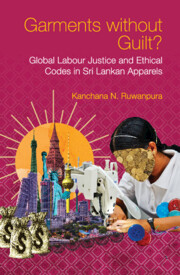Crossref Citations
This Book has been
cited by the following publications. This list is generated based on data provided by Crossref.
2023.
Theory and Explanation in Geography.
p.
269.
Wickramasingha, Shyamain
2023.
Geographies of dissociation: informality, ethical codes and fragmented labour regimes in the Sri Lankan apparel industry.
Journal of Economic Geography,
Vol. 23,
Issue. 6,
p.
1191.
Biswas, Ritwika
2023.
Embracing the uncertain—figuring out our own stories of flexibility and ethics in the field.
Gender, Place & Culture,
Vol. 30,
Issue. 8,
p.
1126.
Wickramasingha, Shyamain
2023.
Constructing (Im)Perfect Geographical Knowledge: Negotiating Positionality in Comparative Field Sites.
The Professional Geographer,
Vol. 75,
Issue. 5,
p.
776.
Ruwanpura, Kanchana N
2023.
Frayed social safety: Social networks, stigma, and COVID-19 – The case of Sri Lankan garment workers.
Environment and Planning C: Politics and Space,
Vol. 41,
Issue. 7,
p.
1317.
Rajapakshe, Wasantha
and
Chandrasiri, T.G.S.D.
2023.
Job security in the apparel industry in Sri Lanka.
Work Organisation, Labour & Globalisation,
Vol. 17,
Issue. 2,
Raj-Reichert, Gale
2023.
Labour geography I: Labour agency, informal work, global south perspectives and the ontology of futures.
Progress in Human Geography,
Vol. 47,
Issue. 1,
p.
187.
Munasinghe, Prabod Dharshana
2024.
Textiles of Sri Lanka.
p.
167.
Jenkins, Laura Dudley
2024.
‘Band aid’ for women in the ready-made garment industry: self-help and surveillance in Bangladesh.
Globalizations,
Vol. 21,
Issue. 1,
p.
1.
Kupriyanov, A.
2024.
Sri Lanka Crisis: The Long Shadow of Neocolonialism.
World Economy and International Relations,
Vol. 68,
Issue. 3,
p.
79.
Ruwanpura, Kanchana N.
2024.
Tenacity Besides Depletion: Pandemics, Protests, and Workers from the Sri Lankan Apparel Sector.
Antipode,
Vol. 56,
Issue. 5,
p.
1857.
Wickramasingha, Shyamain
and
Smith, Adrian
2025.
The fragility of public-private labour governance in times of crisis: The Sri Lankan apparel industry in post-pandemic times.
Environment and Planning A: Economy and Space,
Wickramasingha, Shyamain
2025.
Intersection of crises, discourses, and gender ideologies in change making: The case of Sri Lankan labour law reforms.
Competition & Change,
Ruwanpura, Kanchana N.
2025.
Karl Polanyi in Sri Lanka: Odious Debt and Corrupted Capitalism.
Journal of Economic Issues,
Vol. 59,
Issue. 1,
p.
1.



